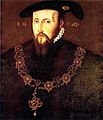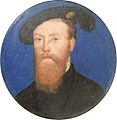Margery Wentworth facts for kids
Quick facts for kids
Margery Seymour
|
|
|---|---|
| Born | c. 1478 |
| Died | 18 October 1550 (aged 71–72) |
| Nationality | English |
| Title | Lady Seymour |
| Spouse(s) | |
| Children |
|
| Parent(s) | Sir Henry Wentworth Anne Say |
Margery Wentworth (born around 1478, died 1550) was an important lady in English history. She was married to Sir John Seymour. Margery is most famous for being the mother of Queen Jane Seymour. Jane was the third wife of King Henry VIII of England. This also made Margery the grandmother of King Edward VI of England.
Margery's Family Background
Margery was born around 1478. Her parents were Sir Henry Wentworth and Anne Say. Her mother, Anne, was the daughter of Sir John Say and Elizabeth Cheney.
Margery had cousins, Elizabeth and Edmund Howard. They were also parents to royal wives. Elizabeth Howard was the mother of Anne Boleyn. Anne Boleyn was another wife of King Henry VIII. Edmund Howard was the father of Catherine Howard, who also married King Henry VIII.
Margery's family had a connection to the royal family. Her ancestor, Elizabeth Cheney, was related to King Edward III. This distant royal link was one reason why Henry VIII considered Margery's daughter, Jane, a suitable queen.
Margery's father, Henry Wentworth, was an important person in politics. He helped keep the peace in Yorkshire. He was also given the title of Sheriff of Yorkshire.
Margery's Early Life
As a young woman, Margery lived in the home of her aunt, the Countess of Surrey. There, she met a famous poet named John Skelton. Margery became his inspiration for some of his poems.
Skelton and others thought Margery was very beautiful. In his poems, he praised her kind and gentle nature. Skelton's poem, Garland of Laurel, describes Margery as a shy and kind girl. He even compared her to beautiful flowers like primrose.
Marriage and Children
On October 22, 1494, Margery married Sir John Seymour. He was from Wulfhall in Wiltshire. On the same day, her father, Henry, also remarried.
Margery and John Seymour had ten children together:
- John Seymour (died young in 1510)
- Edward Seymour (born around 1500, died 1552). He later became the Lord Protector for King Edward VI. Edward married Catherine Fillol and then Anne Stanhope.
- Sir Henry Seymour (1503–1578). He married Barbara Wolfe.
- Thomas Seymour (born around 1508, died 1549). He married Catherine Parr, who was King Henry VIII's last wife.
- John Seymour (died young)
- Anthony Seymour (died around 1528)
- Jane Seymour (born around 1509, died 1537). She became the queen of Henry VIII and the mother of King Edward VI.
- Margery Seymour (died around 1528)
- Elizabeth Seymour (born around 1518, died 1568). She married Sir Anthony Ughtred, then Gregory Cromwell, 1st Baron Cromwell, and later John Paulet.
- Dorothy Seymour. She married Clement Smith and then Thomas Leventhorpe.
It is believed that Margery and John had a happy marriage. After her husband died, Margery did not remarry. Instead, she focused on raising her children and managing their home, Wulfhall. She made sure her eldest daughter, Jane, learned traditional skills.
Her son Edward became a soldier and served the king. He was the oldest surviving child of the Seymours. Edward later became the Duke of Somerset and Lord Protector of England.
Margery's Death
Margery Wentworth died peacefully on October 18, 1550. Her family was with her when she passed away.
 | Frances Mary Albrier |
 | Whitney Young |
 | Muhammad Ali |





